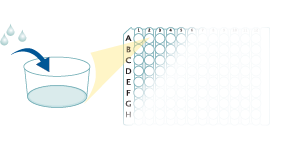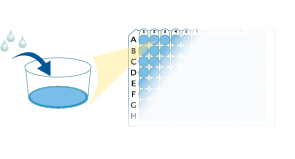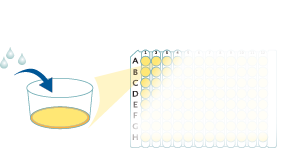Mouse Chemerin Quantikine ELISA Kit Summary
Product Summary
Precision
Cell Culture Supernates, Serum, EDTA Plasma, Heparin Plasma
| Intra-Assay Precision | Inter-Assay Precision | |||||
|---|---|---|---|---|---|---|
| Sample | 1 | 2 | 3 | 1 | 2 | 3 |
| n | 20 | 20 | 20 | 40 | 40 | 40 |
| Mean (pg/mL) | 153 | 405 | 1124 | 168 | 385 | 1065 |
| Standard Deviation | 13 | 16.2 | 99 | 14.2 | 25.7 | 64.1 |
| CV% | 8.5 | 4 | 8.8 | 8.4 | 6.7 | 6 |
Recovery
The recovery of mouse Chemerin spiked to three levels throughout the range of the assay was evaluated.
| Sample Type | Average % Recovery | Range % |
|---|---|---|
| Cell Culture Samples (n=4) | 102 | 89-117 |
Linearity
Scientific Data
Product Datasheets
Preparation and Storage
Background: Chemerin
Chemerin, also known as Tazarotene-induced Gene 2, (Tig-2), is a member of the Cystatin superfamily. Chemerin is synthesized as a 163 aa precursor that contains a hydrophobic 20 aa N-terminal sequence, an intervening 137 aa Cystatin fold-containing domain, and a six aa C-terminal prosegment. It is activated by proteases of the coagulation, fibrinolytic, and inflammatory cascades. Chemerin is a chemoattractant for cells bearing the Chem R23 receptor, including plasmacytoid dendritic cells and tissue macrophages.
Assay Procedure
Refer to the product- Prepare all reagents, standard dilutions, and samples as directed in the product insert.
- Remove excess microplate strips from the plate frame, return them to the foil pouch containing the desiccant pack, and reseal.
- Add 50 µL of Assay Diluent to each well.
- Add 50 µL of Standard, Control, or sample to each well. Cover with a plate sealer, and incubate at room temperature for 2 hours on a horizontal orbital microplate shaker.
- Aspirate each well and wash, repeating the process 4 times for a total of 5 washes.
- Add 100 µL of Conjugate to each well. Cover with a new plate sealer, and incubate at room temperature for 2 hours on the shaker.
- Aspirate and wash 5 times.
- Add 100 µL Substrate Solution to each well. Incubate at room temperature for 30 minutes on the benchtop. PROTECT FROM LIGHT.
- Add 100 µL of Stop Solution to each well. Read at 450 nm within 30 minutes. Set wavelength correction to 540 nm or 570 nm.





Citations for Mouse Chemerin Quantikine ELISA Kit
R&D Systems personnel manually curate a database that contains references using R&D Systems products. The data collected includes not only links to publications in PubMed, but also provides information about sample types, species, and experimental conditions.
10
Citations: Showing 1 - 10
Filter your results:
Filter by:
-
Dynamic and tissue-specific proteolytic processing of chemerin in obese mice
Authors: L Zhao, Y Yamaguchi, WJ Shen, J Morser, LLK Leung
PLoS ONE, 2018-08-30;13(8):e0202780.
Species: Mouse
Sample Types: Recombinant Protein
-
Targeting VEGF-A in myeloid cells enhances natural killer cell responses to chemotherapy and ameliorates cachexia
Nat Commun, 2016-08-19;7(0):12528.
Species: Mouse
Sample Types: Cell Lysates
-
Endothelial cell-derived chemerin promotes dendritic cell transmigration.
Authors: Gonzalvo-Feo S, Del Prete A, Pruenster M, Salvi V, Wang L, Sironi M, Bierschenk S, Sperandio M, Vecchi A, Sozzani S
J Immunol, 2014-01-27;192(5):2366-73.
Species: Mouse
Sample Types: Cell Culture Supernates
-
The chemoattractant chemerin suppresses melanoma by recruiting natural killer cell antitumor defenses.
J. Exp. Med., 2012-07-02;209(8):1427-35.
Species: Mouse
Sample Types: Cell Culture Supernates
-
Expression, Regulation, and Function of Atypical Chemerin Receptor CCRL2 on Endothelial Cells.
Authors: Monnier J, Lewen S, O'Hara E, Huang K, Tu H, Butcher EC, Zabel BA
J. Immunol., 2012-06-13;189(2):956-67.
Species: Mouse
Sample Types: Plasma
-
Disruption of the chemokine-like receptor-1 (CMKLR1) gene is associated with reduced adiposity and glucose intolerance.
Authors: Ernst MC, Haidl ID, Zúñiga LA, Dranse HJ, Rourke JL, Zabel BA, Butcher EC, Sinal CJ
Endocrinology, 2011-12-20;153(2):672-82.
Species: Mouse
Sample Types: Serum
-
ChemR23 dampens lung inflammation and enhances anti-viral immunity in a mouse model of acute viral pneumonia.
Authors: Bondue B, Vosters O, de Nadai P, Glineur S, De Henau O, Luangsay S, Van Gool F, Communi D, De Vuyst P, Desmecht D, Parmentier M
PLoS Pathog., 2011-11-03;7(11):e1002358.
Species: Mouse
Sample Types: Tissue Homogenates
-
The Role of ChemR23 in the Induction and Resolution of Cigarette Smoke-Induced Inflammation.
Authors: Demoor T, Bracke KR, Dupont LL
J. Immunol., 2011-03-23;186(9):5457-67.
Species: Mouse
Sample Types: BALF
-
Sterol regulatory element-binding protein 2 (SREBP2) activation after excess triglyceride storage induces chemerin in hypertrophic adipocytes.
Authors: Bauer S, Wanninger J, Schmidhofer S, Weigert J, Neumeier M, Dorn C, Hellerbrand C, Zimara N, Schaffler A, Aslanidis C, Buechler C
Endocrinology, 2010-11-17;152(1):26-35.
Species: Mouse
Sample Types: Cell Culture Supernates
-
Expression of human chemerin induces insulin resistance in the skeletal muscle but does not affect weight, lipid levels, and atherosclerosis in LDL receptor knockout mice on high-fat diet.
Authors: Becker M, Rabe K, Lebherz C, Zugwurst J, Goke B, Parhofer KG, Lehrke M, Broedl UC
Diabetes, 2010-08-19;59(11):2898-903.
Species: Mouse
Sample Types: Serum
FAQs
No product specific FAQs exist for this product, however you may
View all ELISA FAQsReviews for Mouse Chemerin Quantikine ELISA Kit
Average Rating: 5 (Based on 1 Review)
Have you used Mouse Chemerin Quantikine ELISA Kit?
Submit a review and receive an Amazon gift card.
$25/€18/£15/$25CAN/¥75 Yuan/¥2500 Yen for a review with an image
$10/€7/£6/$10 CAD/¥70 Yuan/¥1110 Yen for a review without an image
Filter by:





